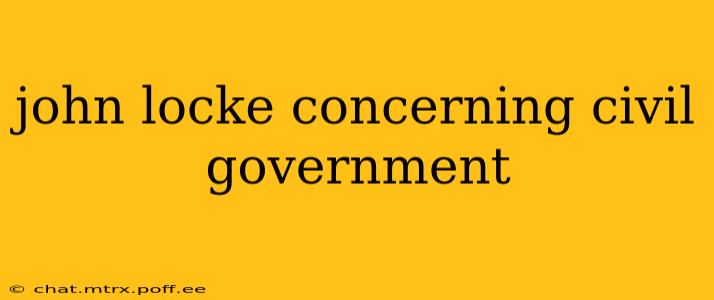John Locke's Two Treatises of Government, particularly the Second Treatise, stands as a cornerstone of Western political philosophy. Published anonymously in 1689, it profoundly impacted the development of liberal thought, influencing revolutions across the globe and shaping modern conceptions of individual rights, limited government, and the social contract. This essay delves into Locke's key arguments, exploring his ideas on natural rights, the state of nature, and the justification for revolution.
What are the main ideas of Locke's Two Treatises of Government?
Locke's Second Treatise outlines a powerful argument for limited government based on natural rights and the social contract. He rejects the divine right of kings, arguing instead that government derives its legitimacy from the consent of the governed. Central to his argument is the concept of natural rights, which he posits as inherent and inalienable, existing prior to any government. These include the rights to life, liberty, and property. Locke believed that individuals in a "state of nature" – a hypothetical condition before the establishment of government – are governed by natural law, which dictates that individuals should not harm one another in their life, liberty, or possessions.
However, the state of nature, while possessing a degree of freedom, also lacks a defined system for resolving disputes and enforcing natural law. This necessitates the creation of a civil government through a social contract, where individuals voluntarily surrender certain rights to a governing body in exchange for the protection of their remaining rights and the establishment of a stable and just society. This government, however, is not absolute; it is bound by the limits of the social contract and the inherent natural rights of its citizens. Crucially, Locke argues that if the government violates the social contract by infringing upon these fundamental rights, the people have the right to alter or abolish it.
What is the social contract theory according to Locke?
Locke's social contract theory posits that government arises from the consent of the governed. Individuals, initially existing in a state of nature, agree to form a political society and surrender certain rights to a governing body in exchange for the protection of their remaining rights and the maintenance of social order. This contract is not a mere agreement between individuals; it forms the basis of the government's legitimacy. It implies a reciprocal relationship: citizens obey the laws, and the government protects their rights. If this reciprocal relationship breaks down, if the government violates the natural rights it was created to protect, the social contract is broken, and the people are justified in resisting or overthrowing the government.
What is Locke's concept of natural rights?
Locke's concept of natural rights is fundamental to his political philosophy. He argues that individuals possess inherent rights that exist independently of government. These rights are not granted by any sovereign or authority but are intrinsic to human existence. The most significant are the rights to life, liberty, and property. The right to life encompasses the right to self-preservation and the right not to be unjustly killed or harmed. Liberty represents the freedom to act according to one's conscience within the bounds of natural law, without undue interference from others. The right to property is arguably the most innovative aspect of Locke's theory. He argued that individuals acquire property through their labor, mixing their effort with natural resources to create something new.
What are Locke's views on the right to revolution?
Locke's theory implicitly supports the right to revolution. If the government consistently fails to uphold its end of the social contract—that is, if it systematically violates the natural rights of its citizens—the people retain the right to alter or abolish that government. This right is not lightly invoked; it is a last resort, used only when all other means of redress have failed. Locke emphasizes that such a revolution should not be undertaken capriciously but only when the government's actions represent a grave and persistent threat to the fundamental rights of the governed. This concept of a right to revolution heavily influenced the American and French Revolutions, providing a philosophical justification for their uprisings against perceived tyranny.
How did Locke's ideas influence the American Revolution?
Locke's ideas had a profound and direct influence on the American Revolution. The Declaration of Independence, with its emphasis on "life, liberty, and the pursuit of happiness," directly echoes Locke's concept of natural rights. The colonists' grievances against British rule centered on the violation of these rights, the assertion that the British government had become tyrannical and had broken the social contract. Locke's arguments provided a powerful intellectual framework for justifying the colonists' rebellion and establishing a new government based on the principles of individual liberty, limited government, and popular sovereignty.
John Locke's Concerning Civil Government continues to be a relevant and influential text in political theory. His arguments for natural rights, limited government, and the right to revolution remain vital components of modern liberal democracies, highlighting the ongoing importance of his enduring legacy.
